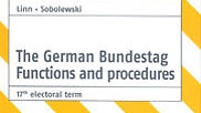Navigationspfad: Homepage > German Bundestag > Members
Remuneration of Members of the German Bundestag

Members’ remuneration is intended to safeguard their independence. © German Bundestag/ Nowak-Katz
Members of the Bundestag are not paid like civil servants or other employees but are holders of a public office. This office must be organised in such a way that all of them can fulfil their mandate regardless of their personal circumstances: the principle of equality of opportunity applies to access to a parliamentary seat.
The office of a Member of the Bundestag, which is generally exercised as a primary occupation, must be remunerated in such a way that it is open to everyone, whether they have hitherto been employees, self-employed persons or freelance professionals. The efficiency of the work of Parliament increasingly depends on the availability of Members from all walks of life with all kinds of specialised knowledge. The idea is that better-paid people are not deterred from standing as parliamentary candidates by the prospect of a significant drop in earnings.
Remuneration must be the same for all Members, must safeguard their independence and must enable them to live in a manner ‘befitting the importance of their office’. That principle was established as a binding norm by the Federal Constitutional Court in 1975 and then applied in the Members of the Bundestag Act (Abgeordnetengesetz) of 1977.
The basic precept is that all elected Members should be able to perform their manifold duties effectively. From 1 July 2016, Members receive a monthly remuneration of € 9,327.21.
The remuneration is supplemented by a tax-free expense allowance to cover costs incurred by Members in the exercise of their parliamentary mandate. This sum is index-linked and is adjusted each year on the first of January. It currently amounts to € 4,305.46 per month. All expenses relating to the parliamentary mandate, from expenditure incurred in connection with a constituency office and a second home in Berlin to the cost of office materials, are to be met using this allowance.


